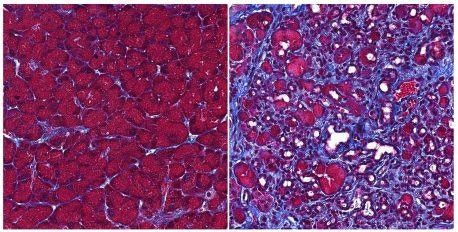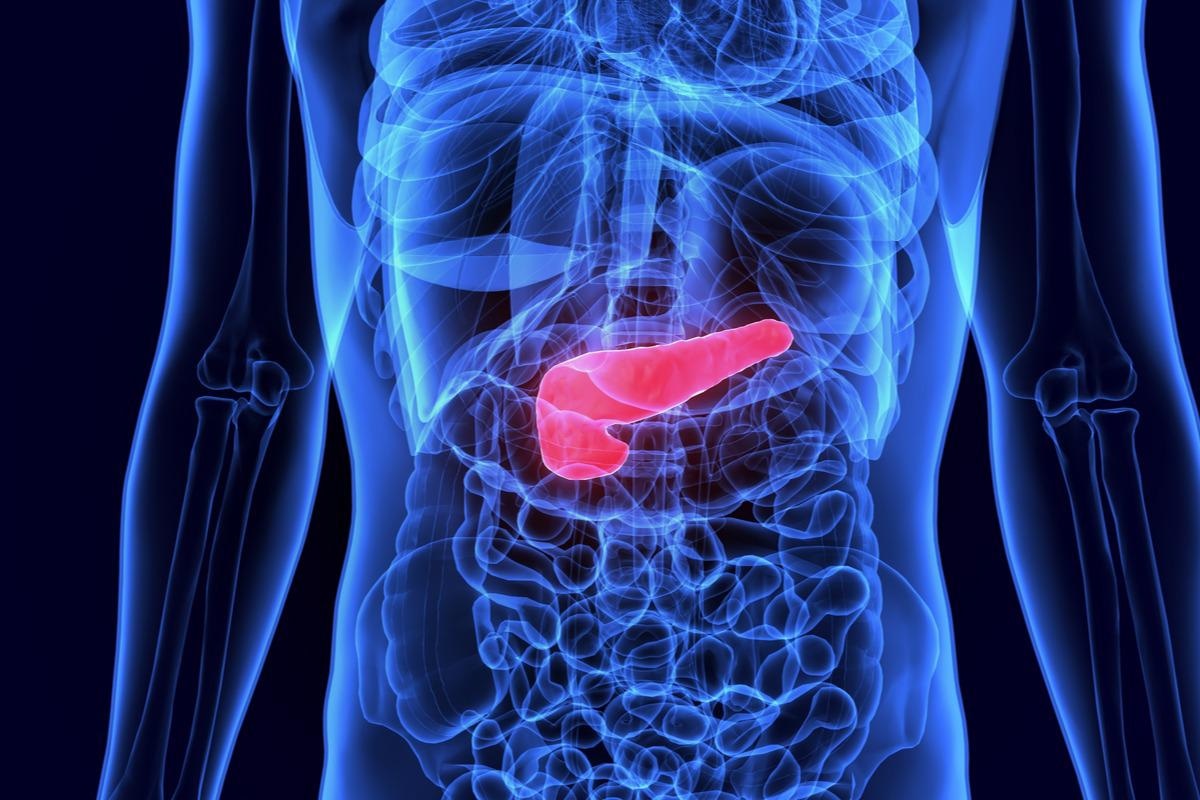Reviewed by Danielle Ellis, B.Sc.Apr 22 2022
The pancreas secretes around a cup of digestive juices per day—a mixture of molecules capable of breaking down the food people consume. However, if these potent molecules are triggered before reaching the gut, they can harm the pancreas, digesting the cells that made them, causing painful inflammation called pancreatitis, and putting a person at risk for pancreatic cancer.
 Acinar cells (red) in a healthy pancreas. Right: Extensive pancreatic scarring (purple) when ERR gamma is lost from acinar cells. Image Credit: Salk Institute
Acinar cells (red) in a healthy pancreas. Right: Extensive pancreatic scarring (purple) when ERR gamma is lost from acinar cells. Image Credit: Salk Institute
Salk researchers now publish in the journal Gastroenterology on April 21, 2022, that a protein called estrogen-related receptor gamma (ERR ɣ) is required for inhibiting pancreatic auto-digestion in mice. Furthermore, researchers discovered that persons with pancreatitis have reduced ERR ɣ levels in cells that are impacted by inflammation.
New medicines aiming at controlling ERR ɣ activity could help prevent and manage pancreatitis and pancreatic cancer, according to these studies.
Our finding provides new insight into both the basic biology of how pancreas cells function, and what might drive pancreatitis and pancreatic cancer.”
Ronald Evans, Study Co-Senior Author and Professor, Salk Institute for Biological Studies
Evans was also the Director of Salk’s Gene Expression Laboratory as well as the March of Dimes Chair in Molecular and Developmental Biology.

Image Credit: Life science/Shutterstock.com
Beta cells, which release insulin to manage blood sugar levels, and acinar cells, which create digestive juices, are the two main cell types found in the pancreas. Evans and his colleagues initially demonstrated that ERR ɣ aids the release of insulin by pancreatic beta cells, suggesting that it could be used as a diabetic treatment. The researchers discovered that mice lacking ERR ɣ had extreme pancreatitis in follow-up experiments.
The researchers studied mice and isolated cells with and without ERR ɣ to better understand its involvement in pancreatic acinar cells. They observed that ERR ɣ is essential for the mitochondria—energy-generating organelles—in acinar cells to operate effectively.
Mitochondria have been known to be the major source of energy in acinar cells since the 1960s, but the factor that controls this vital energy production program in acinar cells has been a long-standing mystery.”
Jae Myoung Suh, Study Co-Senior Author, Korea Advanced Institute Of Science and Technology
Acinar cells that lack ERR ɣ not only have dysregulated energy control but also improperly activate digestive enzymes to begin auto-digestion.
Staff Scientist Michael Downes, a co-author of the study states, “The mitochondria in these cells have to be particularly robust. If things go wrong, those digestive enzymes are activated and then auto-digestion of the pancreas begins.”
The researchers discovered that in the absence of ERR ɣ, not only did auto-digestion of pancreatic acinar cells emerge but also so did cellular alterations that signal early pancreatic cancer.
The scientists then looked at data from pancreatitis patients to see if the mouse and lab findings applied to human disease. They contrasted pancreatitis biopsies to those taken from normal pancreatic cells, as well as healthy pancreas portions from the same patients. Researchers found that cells with pancreatitis had decreased amounts of ERR ɣ.
We examined data across multiple different locations and patient groups and found that ERR ɣ is very consistently decreasing with pancreatitis.”
Tae Gyu Oh, Study Co-First Author and Bioinformatics Analyst, Salk Institute for Biological Studies
The levels of 83 additional genes, many of which are instantly controlled by ERR ɣ, were also modified in the pancreatitis samples, according to Oh and his colleagues. Furthermore, scientists found that some of the 83 genes are linked to rare types of hereditary pancreatitis and pancreatic cancer after they combed through information from two major studies examining gene expression in humans.
“The fact that this was linked back to patients with chronic pancreatitis suggests that ERR ɣ is clinically relevant and could make a good drug target in the future,” says Evans.
Future studies will focus on the pre-cancerous alterations that ERR ɣ dysregulation and pancreatitis cause, as well as how medications could help boost ERR ɣ to stop or cure pancreatic disorders.
Source:
Journal reference:
Choi, J., et al. (2022) Estrogen-Related Receptor γ maintains pancreatic acinar cell function and identity by regulating cellular metabolism. Gastroenterology. doi.org/10.1053/j.gastro.2022.04.013.